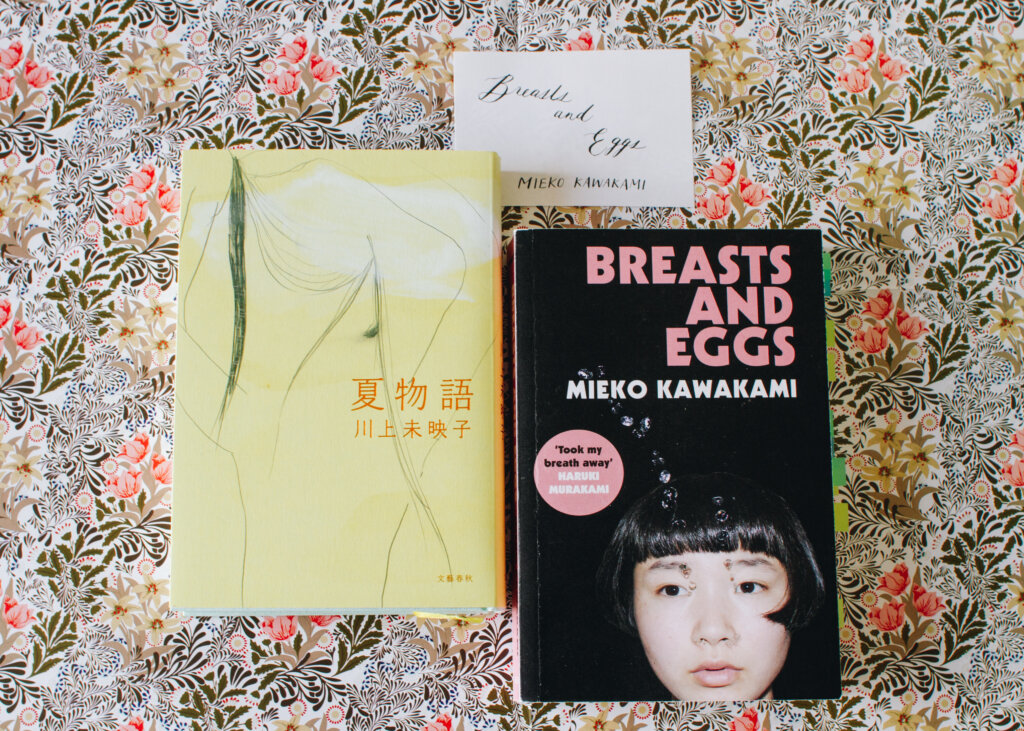
‘Breasts and Eggs’ was originally published as a novella in 2008 as 乳と卵 (Breasts and Eggs), and won the famous Akutagawa Prize in Japan. Later on, in 2019, the entire story was updated to become part 1 of 夏物語 (Summer Story) and has now been published for the first time in English translation as ‘Breasts and Eggs’. The short novella was perfectly adapted into a new novel, deepening the themes of womanhood and motherhood.
2009年に芥川賞を受賞した小編「乳と卵」を、大幅に加筆し、アップデートして2019年にうまれた「夏物語」
女性性や母性について考えさせる、どちらも大好きな作品です。今回、「夏物語」の英語版が「Breasts and Eggs (乳と卵)」として発売されたので、読み返しました。乳と卵という題名で発表されたということは、オリジナルの乳と卵の英語版の出版は予定されていないのだろうか。たしかに似てはいますが、印象が異なる作品なので、オリジナルの方も翻訳されたらいいのに。
I personally think the pressure towards women is much stronger in Japanese society compared to the UK; that’s why this book really empowered me with strong tones of positivity, to support and care about all the choices available to women in their lives. The famous anecdote in Japan is that unmarried women past the age of 25 are called ‘Christmas cake’ because they are past their ‘sell by date’. This is incredibly offensive, but it explains very well how standards of beauty are strongly connected with being young and immature, and how the idea of ‘ageing gracefully’ don’t even exist in the mainstream. Women need to look young forever. A woman’s joy is to raise their own kids…. All of these are common sayings in Japan and convey the sense of a strong commodification of women.
個人的に、女性へのステレオタイプはイギリスより、日本社会の方が強いと感じます。若さや未熟さを美しさと捉える風潮があり、子供を産み育てることこそ女のしあわせ、ずっと若くキレイであることを求められる… 25歳までに結婚することを進める「クリスマスケーキ」なんて表現を未だに聞くことがある日本。だからこそ、いろんな選択肢を「良し」と背中を押してくれるような「夏物語」に、日本人的価値観の中で育った私はとても勇気づけられます。
By discussing why one of the characters, Makiko, wants a boob job so much, and the struggles of Natsu, 38 years old, to undergo artificial insemination, the book raises very important questions about life, how to understand female bodies and respect individual choice.
豊胸手術を希望している巻子、精子提供によって出産を希望する38歳の夏子…それぞれに思い悩む女性たちを描くこの作品は、女性の身体と個人の選択を尊重するというとても大事な人生のテーマについて考えさせます。
In one of her interviews, Kawakami mentions her view towards childbirth in regards to social pressure and the emergence of advanced medical solutions relating to childbirth. This book was written with these ethical questions in mind, based on the author’s own thoughts as a mother of a kid herself.
著者の川上未映子さんはインタビューにて、出産と出産に関する社会の圧力、医療の進歩が可能にする選択肢について、言及しています。倫理的な問いを胸に、母である著者自身の考えも重ねて書かれた作品なのだと感じます。
For some people, discussing these controversial topics might be shocking or a taboo, but this book is more than that. By allowing even the small characters to tell their own life story in relation to these topics, the book will deepen your understanding towards the issues at hand, as well as allow you to consider more about the social stigmas around sexuality. It will really put you in their shoes, so to speak!
こういった話題はタブーと見られがち。でもそれ以上のテーマが語られている1冊だからこそ、いろんな方に読んでほしい。特に、小さなキャラクターにさえも、人生を語らせていることにより、物語に深みが増し、偏見や生の問題、様々な状況を自分ごとと捉え、理解することができます。
In regards to the translation, I must admit that I was not quite convinced with the fact that two male translators – Sam Bett and David Boyd – were involved, despite the theme of the book being so strongly connected to the female body. For instance, I believe men can imagine how menstruation works and feels, but I don’t think they would be able to capture the authenticity of feeling or emotion associated with it. As I really enjoyed the original Japanese text, especially the quality of intimate and honest writing it captured in the characters’ voices, I felt a bit of disappointment that the English version did not trigger that same kind of emotion in me. It might have felt different if it had been translated by a female translator, especially because this book has been praised for being one of the most remarkable feminist books to appear in English in the past few years. Also, while reading, I found a number of inaccuracies and omission of nuance in the translation, which I usually do not spot that many of in other translated versions of Japanese literature. Having said that, overall, I felt the language still flowed relatively naturally and Mieko Kawakami’s beautiful storytelling and literary qualities were all there in the translation too.
最後に、翻訳について。私個人の意見としては、女性の身体に関するテーマが主であるこの本が男性の翻訳家サム・ベットさんとデイビッド・ボイドさんの2名のチームで訳されたというのが、どうしてもまだ納得できずにいます。例えば、男性にも「生理」がもたらす女性の痛みや感情をきっと想像することはできると思いますが、リアルに理解し、適切に表現するのは難しいのではないでしょうか。
日本語の原本を心から大切な作品と感じたからこそ、登場人物たちのとても繊細な言葉のやりとり、身体や性に関するニュアンスを含んだ表現が、英語版ではどこか抜け落ちてしまっているように感じて残念でした。英語圏で「フェミニストの本」としてとてもよく読まれている今、この本が女性によって訳されていたら、もっと繊細で、心に響く作品となったのではと考えずにいられません。また、英語訳そのものについても、(普段から英語訳された日本の作品を、間違い探しをするような読み方をしているつもりはありませんが、)今回は誤訳と感じる箇所も複数あり、気になりました。細かいことを指摘してしまいましたが、全体的には流れるようなスムーズな読み口を表現した良い英語訳です!
何より、大好きな日本の作品が世界中で読まれていることに、いちファンとしてわくわくしますね!
文藝春秋
Pan Macmillan (Translated by Sam Bett and David Boyd)
